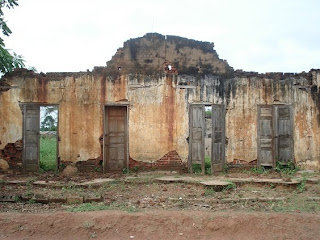After a five-hour wait at Kindu’s airport and a two-hour flight with UNHAS, I just arrived back in Goma - capital of North Kivu. However, there is one post regarding Maniema that I still want to share.
Both Arabs and Belgians were present in Maniema. During the nineteenth century this was an important area for Arabs for ivory, gold and slaves which were sent overland to Zanzibar. Also Belgians were here until independence fifty years ago. Arab and Belgian constructions are still very much present. In Kibombo, with a little imagination, you see a Belgian colonial family walking through the street. It seems as if time has stand still ever since independence. The Congolese have not maintained the buildings since the Belgians left. People camp inside them. And what is newly build are wooden sheds or half-build adobe houses. Even after more than fifty years the colonial constructions by far outbeat the newly build constructions in both grandeur and quality. It is a really strange (and frustrating) feeling when walking through either Kibombo or Kindu. Why were people able to build houses, roads, trainstations, ports, etc. a million times better fifty years ago then they do now? Why don't people get their act together now?
While it doesn't answer the questions raised above directly, I think there are two important reasons why Congolese have a tendency not to maintain nor renovate buildings. First, the colonial buildings are often for government employees. The government is responsible for their upkeep. Moreover, government employees often haven't been paid in many months. And if they get paid it is close to nothing. Second, even if they have money to do maintenance, there is no system of property rights or enforcement of them. As a result, if you would invest in your house and make it nice, a more powerful person would take it from you. As an indication of the lack of property rights, see the picture below that I shot in Bukavu. This is quite a common sight in Bukavu and other cities. People write on the building « Cette parcelle n’est pas a vendre », or "This is not for sale". All because there are no clear ownership rights in the Congo.





No comments:
Post a Comment